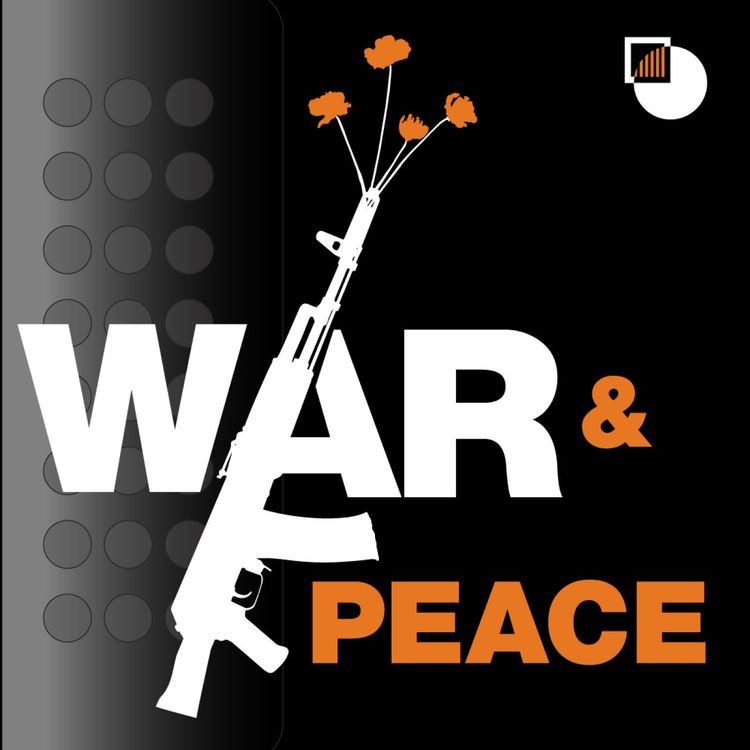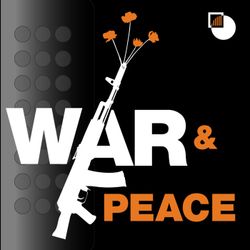Share

War & Peace
Two Years Into Full-Scale War, What Ukraine Needs and What its Backers Can Give
In this episode of War & Peace, Olga and Elissa are joined by Alissa de Carbonnel, Crisis Group’s Deputy Europe and Central Asia Director, and Simon Schlegel, Senior Ukraine Analyst, to talk about the latest developments along Ukraine’s front lines and the uncertainties emerging around support from Kyiv’s Western backers. They talk about the Russian takeover of Avdiivka on 17 February, what it means for the progress of the war and whether further Russian gains should be expected given Kyiv’s shortfalls in ammunition and personnel. They discuss how Europe is reacting to the gridlock in Washington over additional aid for Ukraine and why it has been difficult for the EU to ramp up its own arms production to meet Kyiv’s needs. They also assess how the trajectory of the war and the prospect of declining support from the West is perceived in Ukraine and how Kyiv might adapt in the year ahead.
For more on the topics discussed in this episode, check out our Ukraine country page.
More episodes
View all episodes

5. Lucian Kim on Russia, Ukraine and His New Book “Putin’s Revenge”
33:35||Season 6, Ep. 5In this episode of War & Peace, Olga Oliker speaks with Lucian Kim, Crisis Group’s Senior Ukraine analyst, about his new book “Putin’s Revenge: Why Russia Invaded Ukraine”. They reflect on Lucian’s decades-long career as a journalist covering pivotal political events in Russia and Ukraine, from Ukraine’s 2004 Orange Revolution and the 2014 Euromaidan protests to Russia’s full-scale invasion of Ukraine in 2022. They explore Moscow’s increasingly strained relations with Kyiv and Western capitals, Russian President Vladimir Putin’s shift from a pragmatic leader to an increasingly authoritarian strongman, and what led to his decision to launch the deadliest conflict in Europe since the Second World War. They also discuss which lessons Western policymakers should draw to better engage with Ukraine and Russia to secure European security in the future.For more, be sure to check out Lucian’s book “Putin’s Revenge: Why Russia Invaded Ukraine”, our latest Q&A “Mobilisation, Peacemaking and Deterrence in Ukraine”, and our Ukraine country page.
4. A New European Commission Faces a Fast-changing World
33:20||Season 6, Ep. 4In this episode of War & Peace, Olga and Elissa are joined by Lisa Musiol, head of EU affairs to discuss the challenges facing the new European Commission. They ask what the appointment of more right-leaning commissioners might mean for its policy direction and discuss the priorities of the new EU High Representative for Foreign Affairs, Kaja Kallas, particularly regarding the war in Ukraine and the future of European defence policy. They examine how the EU is preparing for a second Trump administration and the prospect of Washington reducing its defence commitments to Europe. They also discuss the EU’s evolving global role and whether it can manage to adapt to a fast-changing world order. Note: This podcast episode was recorded prior to the ouster of Bashar al-Assad in Syria, and thus does not address events in that country and their repercussions.For more, check out the latest update to our EU-Watch List and our Europe and Central Asia program page.
3. What Next for Georgia and Its Breakaway Regions after Contested Elections?
34:41||Season 6, Ep. 3In this episode of War & Peace, Olga and Elissa are joined by Tbilisi-based journalist Joshua Kucera to discuss Georgia’s contested parliamentary elections and the prospects for the country and its breakaway regions Abkhazia and South Ossetia. They look at what explains the electoral success of the ruling Georgian Dream party, what’s behind allegations of vote rigging and why the opposition has struggled to mobilise its support base in the aftermath of the polls. They explore Tbilisi’s shifting relations with Moscow and Brussels, focusing on why the war in Ukraine and politics in the South Caucasus have driven Georgia away from the project of Western integration. They also examine the recent unrest in Abkhazia, the complicated relations among Georgia, the breakaway regions and Russia, and the EU’s future as a mediator and monitor in the region. For more, check out Joshua’s New York Times op-ed “This Country Turned Against the West, and It’s Not Coming Back”, Crisis Group’s commentary “Georgia: How to Tread Carefully and Preserve the EU’s Diplomatic Role” and our Georgia country page.
2. U.S. Elections: Trump, Harris and Transatlantic Relations
35:53||Season 6, Ep. 2In this episode of War & Peace, Olga and Elissa speak with Jeremy Shapiro, U.S. Program Director at the European Council on Foreign Relations, about what the possible outcomes of the U.S. presidential election could mean for the future of transatlantic relations and European security. They weigh Donald Trump’s and Kamala Harris’ competing views about NATO and the value of multilateral alliances. They assess how European leaders can prepare for a more transactional Washington should Trump return to office and whether they can expect continuity of President Biden’s Atlanticist foreign policy if Harris is elected. They also discuss the extent to which far-right leaders in Europe would benefit from a second Trump presidency and how each candidate would go about finding an end to the war in Ukraine. For more, check out our commentary Toward a Plan B for Peace in Ukraine, our President’s Take The EU Awaits the U.S. Vote as Conflicts Rage and our Ripple Effect podcast on the U.S. elections.
1. A Still-fraught Path to Peace for Armenia and Azerbaijan
41:36||Season 6, Ep. 1In the first episode of a new season of War & Peace, Olga and Elissa talk with Konul De Moor, Crisis Group’s consulting South Caucasus Analyst, about the difficult path toward peace between Armenia and Azerbaijan after Baku gained full control of Karabakh following a lightning offensive in September last year. They discuss the obstacles Baku faces in integrating Karabakh, including managing the return of displaced people and large-scale demining needs. They assess the peace process between Baku and Yerevan, the remaining sticking points to a deal and whether there is still a risk of an armed escalation between the two sides. They unpack the changing role of outside actors in the South Caucasus, including Russia’s struggle to maintain a foothold in the region and prospects for normalisation between Türkiye and Armenia. They also explore what roles Western powers can play in bringing Armenia and Azerbaijan closer to a peace agreement. Click here to listen on Apple Podcasts or Spotify.For more about the topics discussed in this episode, check out our Armenia-Azerbaijan Conflict page.
12. Prisoners of the Past? Political Crises and Ethnic Tensions in the Western Balkans
38:10||Season 5, Ep. 12In this episode of War & Peace, Olga speaks with Crisis Group’s consulting senior Balkans analyst Marko Prelec about the enduring political and ethnic tensions in the Western Balkans. They discuss the looming risk of Bosnia and Herzegovina breaking up amid secessionist threats by authorities in Republika Srpska and grievances among Bosnia’s ethnic groups with its political system and its international supervision. They talk about the challenges of reconciliation in Bosnia as the country commemorates the anniversary of the Srebrenica Genocide this month. They then unpack the tensions between Kosovo and Serbia and Pristina’s efforts to assert authority in the Serb-majority north of the country. They also ask about the prospects of EU enlargement to the region and the lessons identified from Balkan efforts to remember, build on, and move past contentious histories. For more about the topics discussed in this episode, check out our EU Watchlist commentary Helping Keep Bosnia and Herzegovina Together and our report Northern Kosovo: Asserting Sovereignty amid Divided Loyalties.
11. A Long War in Ukraine? Perspectives from Kyiv and Washington
36:49||Season 5, Ep. 11In this episode of War & Peace, Olga and Elissa speak with Lucian Kim, senior Ukraine analyst at Crisis Group, about how perspectives on the war in Ukraine are evolving in Kyiv and Washington and how both capitals grapple with the prospect of a long war as the U.S. heads for elections. They speak about what has changed in Ukraine since the beginning of Russia’s full-scale invasion and how much unity there is among Ukrainian society and its leadership over the trajectory of the war. They unpack Ukraine’s new mobilisation law, how it is received by the military and ordinary citizens and whether it will have a substantial effect on the country’s war effort. They also assess where Washington’s Ukraine policy might be headed amid divisions in Congress over continued military support for Kyiv, how big of a role the war has played in the run-up to the U.S. elections and how Ukrainians view the prospect of a second Trump presidency. For more about the topics discussed in this episode, check out our reports Ukraine: How to Hold the Line and A Fraught Path Forward for Ukraine’s Liberated Territories and our Q&A An Embattled Kyiv Looks for Aid in the Diplomatic Arena.
10. Could Far-Right Electoral Gains Upend EU Foreign Policy?
38:04||Season 5, Ep. 10In this episode of War & Peace, Olga and Elissa speak with Crisis Group’s senior EU analyst Marta Mucznik and Senior Policy Fellow at the European Council on Foreign Relations Susi Dennison, about the upcoming European Union parliamentary elections. With predictions of right-wing gains high, they ask what such an electoral outcome could mean for foreign policy. They also look at the factors driving the rise of far-right parties throughout Europe, their ideological profiles and visions for Europe’s future. Specifically, they speculate on potential implications for EU support for Ukraine, relations with China and enlargement policy. They also discuss whether the far-right in Europe will keep gaining influence and what an increasingly fragmented political landscape could mean for the future.For more about the topics discussed in this episode, check out ECFR’s policy brief A sharp right turn: A forecast for the 2024 European Parliament elections and our EU Watch List 2024 – Spring Update.
9. Moldova’s Restive Separatists, Russia Worries, and EU Aspirations
31:20||Season 5, Ep. 9In this episode of War & Peace, Olga and Elissa speak with Crisis Group’s Oleg Ignatov, Senior Russia Analyst, and Marta Mucznik, Senior EU Analyst, about Moldova’s increasingly fraught relations with its breakaway region of Transnistria and Gagauz autonomous region, the recent appeals the two issued to Moscow for protection and implications for Chisinau’s EU membership goals. They discuss the shifting power dynamics between Transnistria and the pro-EU integration government in Moldova since Russia’s full-scale invasion of Ukraine and what the breakaway region’s larger economic dependence on Chisinau and the EU means for the prospect of reunification. They assess Russia’s involvement in Moldova and Moscow’s geopolitical aims in the region. They also talk about how the EU views the situation in Moldova and what Chisinau and others can do to prevent tensions further escalating.For more about the topics discussed in this episode, check out our Moldova country page.